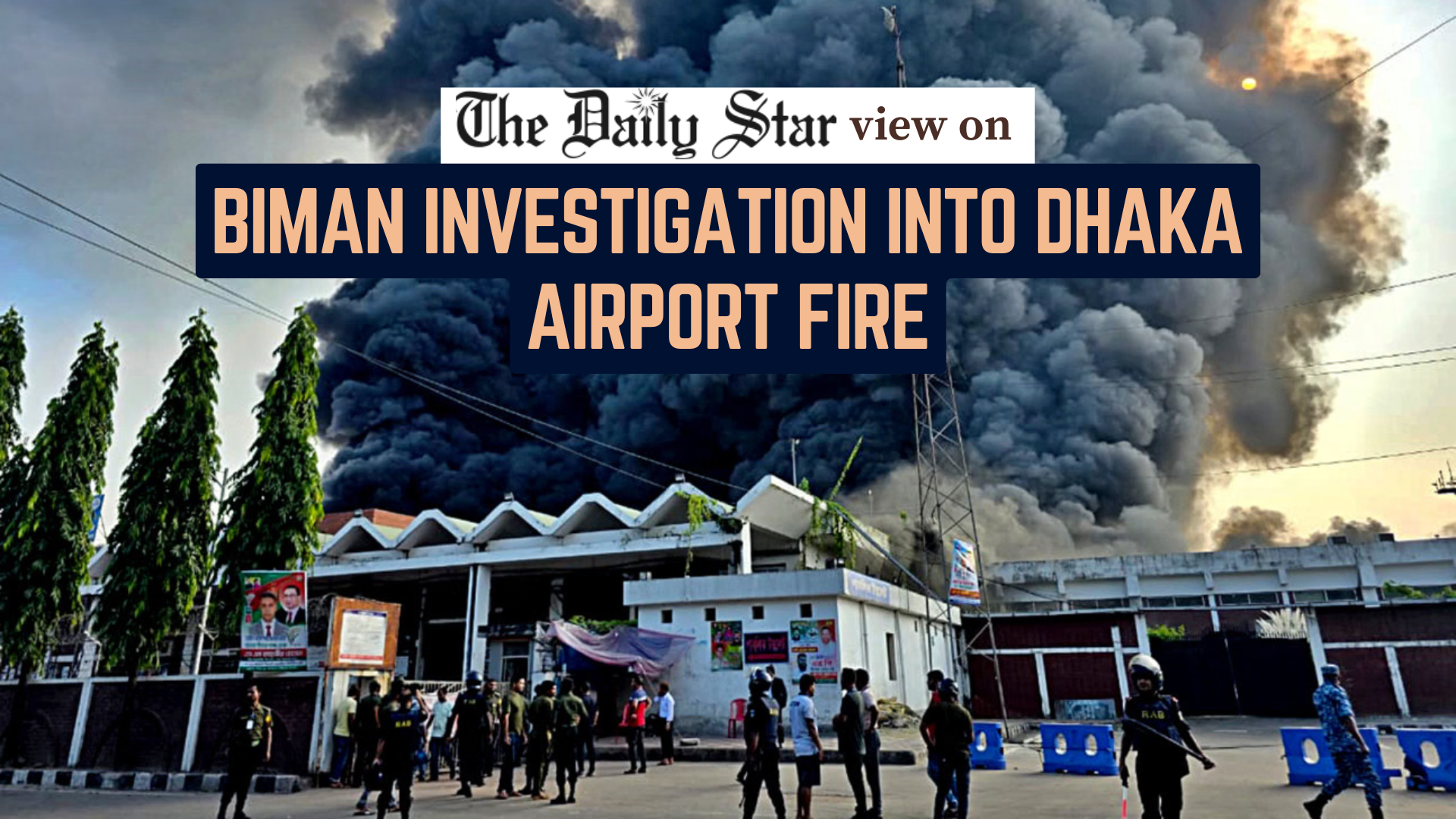What’s happening at Dhaka airport is a symptom of deeper rot

There are few places in a country that so completely represent its image as an airport. It is both a threshold and a mirror, reflecting not just the physical state of a nation but the moral tone of its institutions. For Bangladesh, Hazrat Shahjalal International Airport (HSIA) has long stood as that symbolic gateway—the first and last impression for millions who travel in and out of the country each year. Yet, what should have been a showcase of national pride has instead turned into a gallery of recurring scandals, thefts, fires, and failures. The latest wave of incidents exposes a deeper truth: the crisis at HSIA is not merely about stolen luggage or lapses in vigilance, but about the systemic rot corroding Bangladesh's culture of public accountability.
The cargo village fire, the theft of firearms from a strongroom, the Ansar member stealing 15 mobile phones, the pilfering of foreign currency from passengers, and the daily reports of missing baggage are not isolated incidents. They form part of a broader continuum of decay. According to data from the airport's lost and found department, an average of three luggage thefts are reported every day, amounting to over 500 incidents in six months. If we include unreported cases, the real figure could be significantly higher. Each missing suitcase tells a story not just of loss, but of a system unable or unwilling to protect its own citizens and guests.
For an airport handling over 80 lakh passengers annually, the issue is not just about individual delinquency but institutional dysfunction. A place that should operate with the precision of clockwork instead runs on improvisation, patronage, and opportunism. The most alarming aspect of these crimes is that they are often committed by those entrusted to prevent them. When custodians of order turn into predators, the problem ceases to be about law enforcement—it becomes a moral epidemic.
Every airport has its share of human error, but when thefts occur with such regularity and within high-security zones under surveillance cameras, it indicates complicity across multiple layers. The term "syndicate" is not used lightly. These are organised rings, enabled by weak supervision, fragmented accountability, and at times the quiet tolerance of superiors. If an employee can repeatedly access and tamper with passengers' belongings without being detected, it means the system's safeguards are either cosmetic or compromised. Authorities tend to isolate incidents as cases of "individual dishonesty," distancing the larger structure from blame. But such denial misses the point. Individual dishonesty thrives only where collective indifference permits it.
The airport, by its nature, concentrates multiple agencies, such as customs, security forces, airlines, immigration, and logistics. Where responsibilities overlap without coordination, accountability evaporates. Each department has its own chain of command, yet when a breach occurs, none bears full responsibility. This bureaucratic diffusion is fertile ground for malpractice. A theft inside a secure baggage area should be traceable within minutes through camera footage and access logs. Yet in many cases, investigations drag on and evidence disappears. The fire at the cargo village revealed even darker layers. The breaking of the strongroom and the disappearance of firearms after the blaze showed not merely opportunism but audacity. It raised an alarming question: if weapons can be stolen from a high-security storage area, what assurance remains for passengers and foreign airlines about the safety of cargo and personnel?
Globally, airport thefts are treated as serious breaches of national security. Singapore's Changi or Dubai International—handling many times HSIA's traffic—maintain near-zero tolerance policies backed by real-time surveillance, centralised accountability, and immediate suspension protocols. In Bangladesh, by contrast, the issue often descends into reactive measures: suspensions after media coverage, arrests after political pressure, and cosmetic reforms following public outcry. The absence of sustained institutional correction ensures that scandals repeat with seasonal regularity.
Underlying all this is a culture of low consequence. Suppose, if a passenger loses luggage worth Tk 70,000, the individual receives compensation capped by outdated international conventions that barely cover the loss. When employees are caught stealing, they are dismissed or briefly detained, but the chain behind them remains untouched. The same officers reappear in new uniforms, new departments, or under new titles. In such a cycle, wrongdoing becomes routine.
The economic implications are no less significant. Every lost bag and stolen item diminishes confidence among foreign travellers, expatriate workers, and airlines. Reputational damage, though intangible, carries heavy costs. Foreign carriers are increasingly cautious about ground handling at HSIA. Insurance premiums for freight and cargo rise when risk perception grows. Tourists, investors, and development partners—all interpret such chaos as a reflection of broader governance challenges. An airport is often a nation's first impression, but for Bangladesh, it risks becoming a cautionary tale.
Fixing this crisis demands more than cosmetic reform. Surveillance cameras and uniformed guards cannot replace institutional integrity. The solution must begin with depoliticising airport management and professionalising its workforce. Recruitment should prioritise merit and ethics over connections. Each incident must trigger not just disciplinary but systemic review. Equally vital is inter-agency accountability. The division of duties among the Civil Aviation Authority, Biman Bangladesh Airlines, and law enforcement must be redefined with measurable outcomes. The baggage-handling process should be fully traceable from check-in to claim, using modern digital tagging systems as practised in most international airports. Independent audits of cargo and security operations should be mandatory, and findings made public. Only through transparency can public confidence be rebuilt.
Yet perhaps the greatest reform lies not in machinery but in mindset. For decades, public service in Bangladesh has been treated as an entitlement rather than a responsibility. Changing this culture will require moral leadership. The stain at the nation's gateway is not indelible, but it will not vanish through denial or temporary punishment. It demands an admission that the problem is systemic, not sporadic. Every act of theft, every fire, every lost suitcase erodes the fragile bond between citizen and state. Restoring that bond will take more than policy directives. It will take courage, vigilance, and the will to confront the ghosts within the mustard—those entrenched interests feeding off the nation's carelessness.
H. M. Nazmul Alam is an academic, journalist, and political analyst based in Dhaka. Currently, he teaches at International University of Business Agriculture and Technology (IUBAT) and can be reached at nazmulalam.rijohn@gmail.com.
Views expressed in this article are the author's own.
Follow The Daily Star Opinion on Facebook for the latest opinions, commentaries, and analyses by experts and professionals. To contribute your article or letter to The Daily Star Opinion, see our guidelines for submission.




 For all latest news, follow The Daily Star's Google News channel.
For all latest news, follow The Daily Star's Google News channel. 

Comments